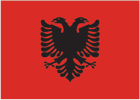Compare
Vatican City
to
Albaniato
AlbaniaVatican City is a city-state within Italy and the seat of Roman Catholicism
There's really just not enough data on Vatican City to relate it to other countries, so we're just having some fun here.
 With its 3,020,209 people, Albania is the
137th largest country in the world by
population. It is the 143rd largest country in the
world by area with 28,748 square kilometers.
With its 3,020,209 people, Albania is the
137th largest country in the world by
population. It is the 143rd largest country in the
world by area with 28,748 square kilometers.
Albania declared its independence from the Ottoman Empire in 1912, but was conquered by Italy in 1939, and occupied by Germany in 1943. Communist partisans took over the country in 1944. Albania allied itself first with the USSR (until 1960), and then with China (to 1978). In the early 1990s, Albania ended 46 years of xenophobic communist rule and established a multiparty democracy. The transition has proven challenging as successive governments have tried to deal with high unemployment, widespread corruption, dilapidated infrastructure, powerful organized crime networks, and combative political opponents. Albania has made progress in its democratic development since first holding multiparty elections in 1991, but deficiencies remain. International observers judged elections to be largely free and fair since the restoration of political stability following the collapse of pyramid schemes in 1997; however, each of Albania's post-communist elections have been marred by claims of electoral fraud. The 2009 general elections resulted in a coalition government, the first such in the country's history. In 2013, general elections achieved a peaceful transition of power and a second successive coalition government. Albania joined NATO in April 2009 and is a potential candidate for EU accession. Although Albania's economy continues to grow, it has slowed, and the country is still one of the poorest in Europe. A large informal economy and an inadequate energy and transportation infrastructure remain obstacles.
Check out the recommended reading list below for great sources of information on Albania